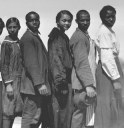|
|
 |
 |
|
Reading Guide |
| 7. |
1917: Forward
| - | Letters from black migrants in Chicago, 1917, excerpts |
| - | Norfolk [Virginia] Journal and Guide et al., coverage of African American labor organizing, 1917 |
| - | The Ohio Federation for Uplift Among Colored People, "Are You With Us?," pamphlet, 1917 |
| - | Jelly Roll Morton, "Jelly Roll Blues," ca. 1911, as performed in 1924 |
|
|
 Tennessee, 1917 |
"I just begin to feel like a man," writes a black man, a newcomer in Chicago in 1917, to a friend back in Mississippi. "I don't have to umble to no one." Amidst the racial strife of 1917—prejudice against black soldiers, fierce resistance to black labor organizing, massive rioting in Houston and East St. Louis—these words sound a note of hope. In this spirit, a group of Ohio black leaders issued a call to sympathetic whites—"Are You With Us"—to cooperate in their work to alleviate the "acute problems brought about by the unprecedented migration" of southern blacks to their area. "We have the 'pep' of desire to 'do our bit,'" they conclude, "if you—individually you—will do yours. . . " A new age was is the making, one could speculate.
To conclude your study in this seminar, reflect on the changes in black Americans' lives from 1865 through 1917, a period of fifty-three years. In the background, listen to the piano blues of another black man who left the South in 1917—Jelly Roll Morton, the New Orleans native whose blending of ragtime, blues, and Caribbean music places him among the founders of jazz, often called the only truly American art form. Whites would pay dearly to hear his music in the 1920s and later, music that was spawned in this time. 12 pages.
Discussion questions
- How did the blacks who migrated north express the changes they experienced? What did they find important to relate to their southern friends and family?
- Compare the Ohio blacks' efforts to help the southern migrants to the work of the freedmen's organizations after the Civil War. What distinguishes them most?
- How did efforts to organize black labor fare in the North and in the South? What response is conveyed by the black newspapers in their reporting?
- What spirit do you sense in "Jelly Roll Blues," written in the early 1910s and performed, in the version here, in 1924? How does it complement the texts in this section FORWARD?
- To reflect a framing question in Section One of this seminar, how did African Americans define and exercise power in these years?
- What questions would you deem most significant for a study of African American history in the decade after 1917? What predictions would be implied in the wording of your questions?
|
» Link |
 |
 |
Topic Framing Questions
| • |
What gains and setbacks mark the period of 1907 to 1917 for black Americans? |
| • |
To what extent did African Americans set their own paths forward? |
| • |
How were the lives of ordinary black people affected by black and white leadership? |
| • |
What identity had African Americans created, as a group, between 1865 and 1917? |
| • |
What insights could black Americans take forward into the postwar years and the 1920s?
|
|
|
 |
 |
|
 |
